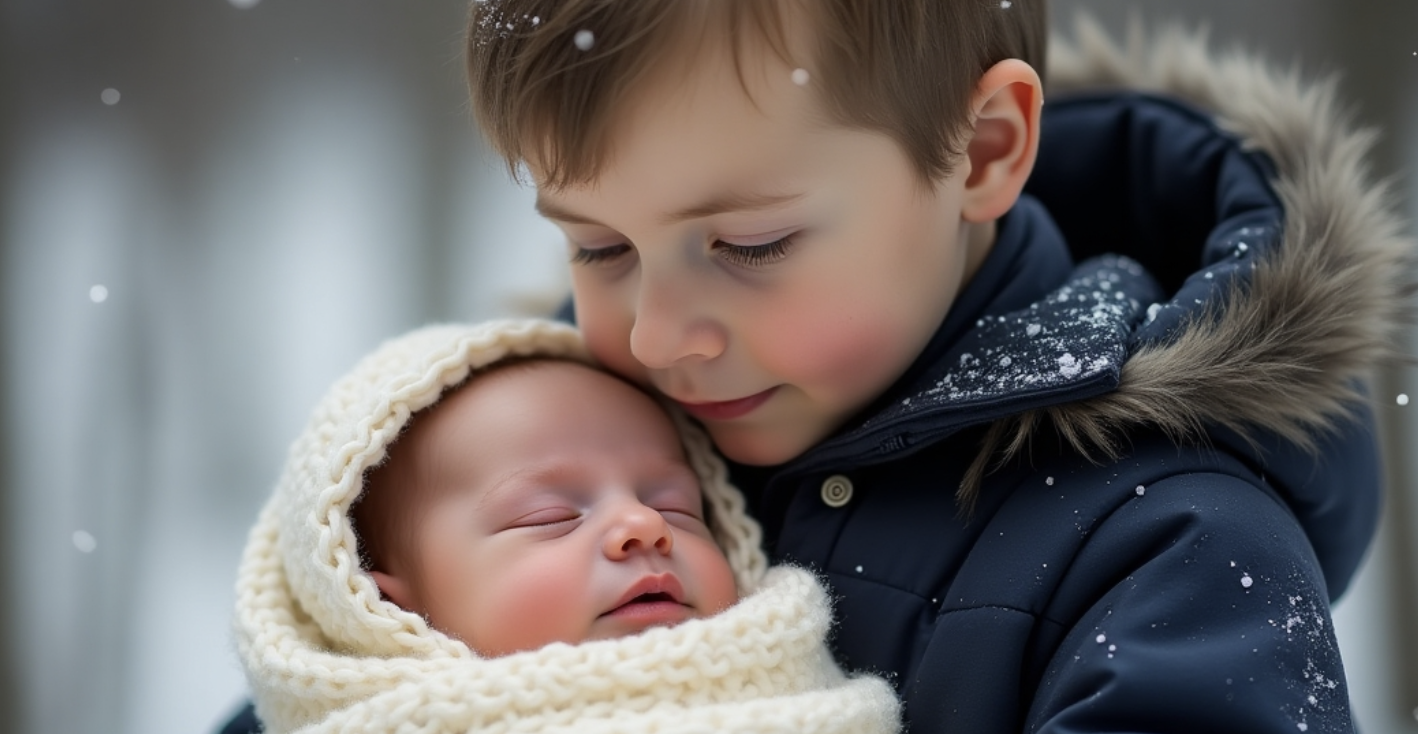An icy storm had covered the provincial town of Lesogorsk. In the dim light of the hospital lamps, in the realm of nighttime silence, Marina Borisova — an experienced administrator, former social worker — was enjoying a rare pause behind the registration desk.
But at 9:47 PM, the hospital door creaked open, letting in a gust of icy wind — and a boy no older than eight. He wore an overly thin down jacket, a worn-out hat dripping with frozen moisture. With trembling hands, he held a child car seat with an infant inside.
“Please… I need help. My sister won’t stop crying,” he rasped, barely able to stand.
His name was Lesha Komarov. He was about eight years old. His sister Alisa was only six months old. The baby’s cheeks were burning, tears streaming non-stop. Something was seriously wrong. Marina’s internal alarm went off.
While the pediatrician took the girl inside, Marina gently questioned the boy. His answers were surprisingly mature for his age. His mother worked nights. His father was “busy.” He had come from the Eastern neighborhood — more than three kilometers through the blizzard. He had brought formula, diapers, and a change of clothes — everything an adult would take. Except he wasn’t quite an adult.
The phone numbers he gave didn’t answer. Alisa was quickly diagnosed — acute otitis, high fever. Her condition was not critical yet but dangerous. The doctors praised Lesha: his actions might have saved his sister from much more serious consequences.
But inside, Marina’s heart clenched. This child, who had come alone in the blizzard, seemed to remind her what it was like to be small and carry burdens too heavy even for adults.
By protocol, child protective services should have been called, but Dr. Abdulova agreed to wait until morning. Marina herself offered to take the children home.
The Eastern district greeted them with dampness and neglect. The elevator was broken. The door to apartment No. 15 was dented, covered with scratches.
“You don’t have to come in,” Lesha said quickly. “I have the key.”
“I need to explain the medications to the parents,” Marina replied firmly.
Inside, there was a smell of smoke, unwashed dishes, and mustiness. A man stirred in a chair — Sergey Komarov. He smelled of homemade liquor.
“What do you want?” he mumbled.
Marina briefly told him what had happened. He only snorted:
“We’ll manage. We’ve got everything under control.”
Lesha stood curled up, holding his sister tightly.
“If anything happens — call,” Marina said, placing a piece of paper with a phone number into his palm.
Outside, the wind howled again, snow falling thickly.
At 11:23 PM Marina lifted her eyes from the computer. Her heart froze: Lesha was standing there again — wet, trembling, without the car seat. Alisa was wrapped in a blanket, pressed to his chest.
“She’s waking up poorly,” he whispered, voice shaking.
The girl burned with fever, her breathing became wheezy. The medics rushed her away. Lesha stayed, standing as if rooted to the floor.
“Parents?” Marina asked cautiously.
“Mom… is sick. Dad left. I left a note… in case they come back,” he lowered his gaze.
His words struck painfully. The diagnosis was worse: severe sinusitis, dehydration, first signs of exhaustion. Previous antibiotics had not been given at all. The diapers had not been changed, and the baby’s skin was inflamed.
“I have to notify child protective services,” the doctor said.
“Please, let me talk to him first,” Marina asked.
Lesha sat in the corner on a tall chair, his legs dangling above the floor. Dark circles of fatigue and fear lay beneath his eyes.
“Now can you tell me everything as it really is?” she asked softly.
“Mom barely gets up. She says her heart hurts. She lies there… even when Alisa cries or wants to eat. Dad leaves. He says he’s looking for work. But he’s gone for days at a time. Sometimes he doesn’t come back at all.”
“Who takes care of you?”
The boy hesitated, then barely whispered:
“I… I take care of everyone. Of Alisa — since the maternity hospital. I’m not complaining. I just want her to be okay.”
Marina and the security guard Zhorin reviewed the surveillance footage. Both nights showed the lonely figure of the child, making his way through the blizzard — with the car seat on the first night and with a blanket the second.
“Twice in one week,” whispered Zhorin. “Where were the adults?”
Marina was already digging through databases. Irina Komarova had quit the hospice three months ago. Sergey had been unemployed since the factory closed. Now their lives boiled down to bottles and slot machines.
She returned to their apartment. The neighbor opened the door.
“Here for the kids? About time.”
Irina opened the door a minute later. Her face was gaunt, hair disheveled, robe dirty. The apartment looked even worse than before.
“They’re sleeping,” the woman mumbled.
“No. They’re in the hospital,” Marina replied firmly. “Your son brought his sister there again. Alone. In the storm.”
Irina slowly sank onto the sofa, as if her body suddenly grew too heavy.
“After giving birth, everything went dark,” she whispered. “At first I thought it was just fatigue. Then it got worse. The days felt like concrete. I couldn’t get up. I couldn’t think. Alisa cried, and I lay staring at the ceiling, praying someone would come and take her.”
Her hands trembled. Dark hollows under her eyes. No doctor had visited her home. No one checked on her condition. She barely noticed the children weren’t there.
“They’re not home?” she asked quietly.
“No. They’re in the hospital. Your son brought his sister in his arms. Through the storm.”
Marina called an ambulance. While waiting, she inspected the apartment. Everywhere were signs of Lesha’s care. Bottles neatly labeled by time, formula sorted, clothes arranged. Toys disinfected, diapers hung, feeding schedules written in a portable box.
In his room — school textbooks, on top of them — a medical journal. And a notebook.
December 5.
Alisa drank all the bottles, no fever, smiled. Mom was in bed all day. Dad came, but after a quarrel left. Gave Alisa teething gel. She liked the music.
December 12.
Alisa cried a lot. Drank only half. Temperature slightly above normal, but not high. I think she got sick again. Mom went to the kitchen, coughed, and went back to bed. Nothing left in the fridge. Gave Alisa the last formula.
These notes were a cry for help wrapped in childlike order. Drawings of superheroes. A certificate for participation in school competitions. An empty crib — Alisa always slept next to her brother.
Child protective services acted promptly. Alisa was kept in the hospital for observation. Lesha was taken to a warm room, given a hot dinner and clean clothes. It was the first time in a long while he was surrounded by real care.
He received it cautiously. But Marina was nearby. She didn’t leave. Sat beside him, asked questions about life with mom and dad, about family relationships. He answered, occasionally glancing toward his sister’s ward. His eyes were full of anxiety… and hope.
Marina didn’t speak about tomorrow. She simply stayed close. To be there, to help. For the first time in a very long time, Lesha met someone who saw not just “a boy with a baby,” but someone fighting with all his might.
He carried a whole world on his small shoulders. His heart was too big for his age. He was not just a brother — he was her protector, her nurse, her support.
And this time — someone saw him. Not only what he did. But the pain he carried inside. The silence, the words between the lines in his diary that no one had ever read before.
This time help came not in the form of papers and protocols. It came in the face of a woman who stayed. Listened. Understood. Acted.
And this time, the storm lost.


